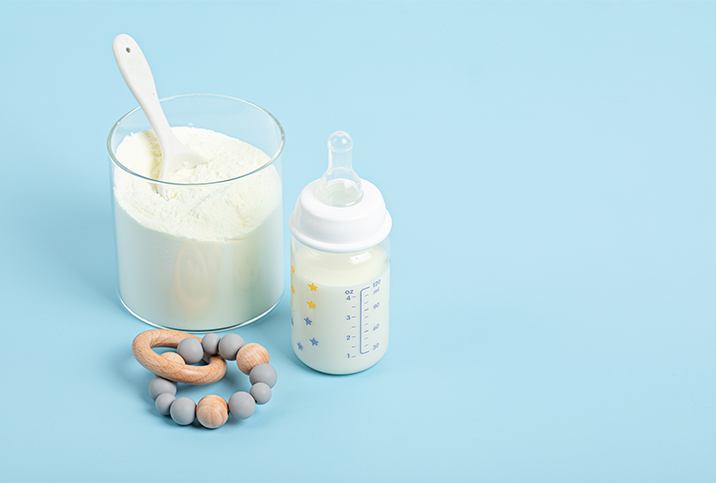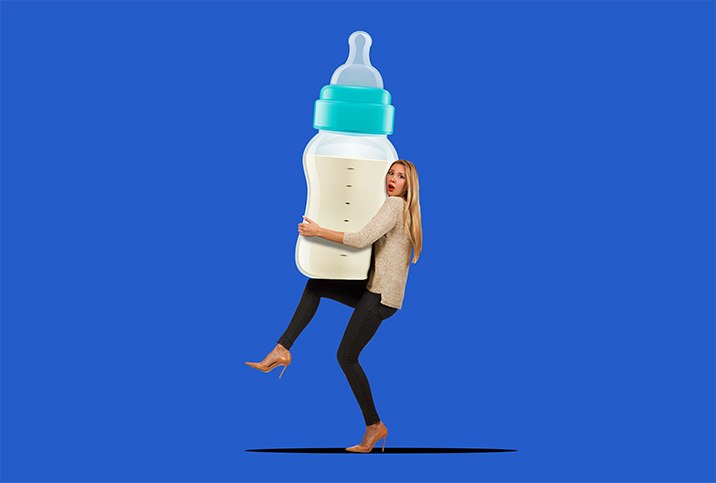Impacted by the Infant Formula Shortage? Here's What You Need to Know

Editor's note: Some of the sources for this article requested their full names and locations not be used.
Teresa's baby was born in early January 2022. From the beginning, their breastfeeding journey had several setbacks. Her baby had a condition called torticollis, which features a tilted head and difficulty turning the head or neck.
"She was uncomfortable at the breast and not transferring due to torticollis," said Teresa, who lives in Beaverton, Oregon. "I became an exclusive pumper. But I also struggle with low supply, so we supplemented with formula ever since we were at the hospital."
The ongoing baby formula shortage in the United States—caused by supply-chain issues and a major recall of three popular brands from the country's largest formula manufacturer—has been big news lately with far-reaching ramifications.
For parents like Teresa who are searching for enough of the right baby formula, the situation feels dire, especially with recent warnings about watching out for milk scams and avoiding homemade recipes.
Fortunately, the end of the shortage is in sight, and there are places to go for help in the meantime. Here's what you need to know.
Supply-chain issues and a major recall
According to news reports, the infant formula shortage started during the COVID-19 pandemic, caused by supply-chain issues. The situation became critical in February 2022, after the Food and Drug Administration (FDA) closed an infant formula manufacturing facility in Sturgis, Michigan, run by Abbott Nutrition, following the deaths of two babies infected with Cronobacter sakazakii, a bacterium that can cause meningitis and septicemia in infants.
Abbott issued a voluntary recall of powdered infant formula to test for the bacteria. In a recent Washington Post op-ed piece, Robert Ford, CEO of Abbott, said the strain of bacteria that was found in four ill babies—two of whom died—was not found in the formula distributed by Abbott. However, during the FDA's investigation, five strains of Cronobacter and code violations were found in the Michigan facility. Ford said these issues will be corrected.
Subject to FDA approval, Abbott could reopen the facility within the next two weeks. The company has stated it will resume production of EleCare, Alimentum and metabolic formulas first, and then resume production of Similac and other formulas. However, it will take six to eight weeks after Abbott reopens the facility before the product will be available on shelves.
Why all the warnings about homemade and diluted formula?
Recipes for infant formula used "in the old days," before manufactured products were readily available, have been appearing all across social media. Some of these images appear as instructions from a hospital, allegedly signed by a doctor and sent along with babies and moms headed home from the hospital following birth.
However, the American Academy of Pediatrics (AAP) and the FDA have warned parents not to try to create their own formula.
"While it is tempting to try to make homemade baby formula during the formula shortage, it can be very dangerous," stated Emily Scott, M.D., medical director of Riley Children's Health Early Years Program in Indianapolis.
"Breastmilk and infant formulas have very specific ratios of carbohydrates, proteins, fats and nutrients that support an infant's growing brain and body. Even minor deviations can cause problems with a baby's growth," Scott continued. "In addition, formula made at home can be more likely to be contaminated with bacteria. There have been infant deaths linked to homemade baby formula."
It's important for anyone who mixes infant formula to use proper sterilization and cleanliness precautions to prevent possible contamination, reminded dietitian Laurine Cetovich, R.D., L.D., at the Ohio State University Wexner Medical Center in Columbus.
According to the Centers for Disease Control and Prevention (CDC), Cronobacter is present in the environment. Cleaning and sanitizing surfaces used in the preparation of infant formula and vigilant handwashing are crucial to prevent infections.
The AAP and FDA have also warned against diluting any formula you may have on hand. Though it may seem like a good way to make formula last longer, it can have detrimental effects.
"When infant formula is diluted or contains too much water for each scoop of formula, a baby's growth can be severely impacted," Scott said. "More importantly, however, a baby's electrolytes, like sodium, can become dangerously low in their blood. This can cause seizures or even death."
Any parent who needs to supplement their infant's feeding should check with their pediatrician for solutions instead of diluting formula or using any recipe found on the internet.
Babies with allergies need special formula
Abbott is the only supplier of several specialty formulas used by babies with rare metabolic diseases and other health concerns, so when the plant shut down in February, these families were left with few options.
The formula Teresa gave her baby was part of the recall, which contributed to her overall anxiety, she said. To make matters worse, in March, her baby developed a sensitivity to the protein in cow's milk, which is found in many formulas. First, Teresa tried switching to a hypoallergenic formula, but it still caused problems for her baby. Then she switched to a formula with the protein completely removed.
"With the shortage, these types of formulas are extremely difficult to find," Teresa said. "One brand is called Neocate. I found it on third-party websites and ended up paying $65 for a 14-ounce can."
She continues to pump breast milk as much as possible.
"I am fortunate that I do have some milk supply and don't have to totally rely on formula, but the mental stress is taxing," Teresa said.
Returning to work after maternity leave added to her stress. She coordinates pumping into her work routine.
"I have my fingers crossed each time that I will pump enough for a bottle," she said.
Breastfeeding moms with a little extra
Clarissa, from Central Ohio, belongs to a moms' group that shares information on breastfeeding and other issues. Since March, several women have joined the group to discuss the formula shortage.
"I know we've had [a] few members recently join because they had trouble finding formula," Clarissa said. "We've also had a few members join specifically for the purpose of donating in response to the formula shortages."
She hasn't spoken to anyone who has had the opportunity to donate yet, but believes this level of generosity is typical of the group. Groups can be found on social media sites such as Facebook, but she recommended connecting with a local La Leche League or your pediatrician's office for advice.
While it can be tempting to accept donated milk, it might not always be safe, and the FDA recommends against feeding babies breastmilk acquired online or through an individual.
If you're a mom with a surplus of breast milk, consider donating to a local milk bank. Since the pandemic, milk banks have been struggling to meet demand, and the need has only increased due to the formula shortage. If you are searching for breast milk to feed your baby, it's important to accept only donated milk from a verified source, such as milk banks, which rigorously test donations to ensure the milk is safe for infants.
Current and forthcoming solutions to the crisis
Though Abbott expects to have shelves restocked within the next two months, parents need formula now. If the shelves in your local stores are bare and the prices online are astronomical, Scott offered the following suggestions:
"If a baby is on a standard infant formula, it is generally safe to use a different formula brand. Babies usually tolerate the change very well," she said. "If your baby is on a specialized formula due to prematurity, severe milk allergy or GI disease, you should reach out to your baby's doctor to see if they can recommend a safe alternative if you are unable to find your baby's regular formula. If you have any concerns about your ability to feed your baby, please call your baby's pediatric healthcare provider to brainstorm a safe solution."
The U.S. Department of Health and Human Services has several solutions on its website:
- Contact your local Community Action Agency (CAA), which may be able to provide formula or connect you with another local agency that can.
- Call 211. United Way's 211 can connect you with a community resource specialist who can help you find food pantries or other charitable sources that may have a supply of formula.
- Find an accredited milk bank. The Human Milk Banking Association of North America (HMBANA) distributes donated breast milk to mothers in need. You may need a prescription from a medical professional to be eligible for HMBANA services, so talk to your pediatrician.
- Contact WIC (Women, Infants and Children). If you're eligible, WIC may be able to help you obtain formula or know of places that have it in stock.
The AAP offers some additional advice on finding formula on its website and states that if you do find some in stock, you should buy no more than a 10-day to two-week supply so other parents can feed their infants, too.
Additionally, the Biden administration held meetings with large retailers and manufacturers to address the shortage. On May 12, the White House announced several steps forward:
- Streamlining manufacturing efforts and simplifying product offerings so formula can be produced and in stores faster.
- The Access to Baby Formula Act, which was passed by Congress on May 19 and loosens restrictions on WIC so a larger variety of products can be purchased using these benefits.
- Working with the Federal Trade Commission (FTC) to crack down on price gouging, unfair market practices and other predatory behavior related to infant formula. If you suspect a scam, report it to the FTC or the attorney general for your state.
- Increasing the supply with imported formula from trading partners in Mexico, Chile, Ireland and the Netherlands.
Some of these actions will help ease the shortage immediately, while others will create lasting changes to help prevent a similar situation in the future.
In partnership with the U.S. government, several brands have announced they will be shipping in formula from overseas to help ease the shortage: Nestlé is flying in 1.5 million bottles of its Gerber-brand baby formula from the Netherlands and Switzerland. Danone's Nutricia is shipping 500,000 additional cans of its specialty medical formula Neocate from Europe. Kendal Nutricare in the United Kingdom is sending 2 million cans of its Kendamil formula. These shipments are scheduled to arrive on U.S. shelves starting in June.
"We continue to do everything in our power as part of the all-of-government efforts to ensure there's adequate infant formula available wherever and whenever parents and caregivers need it," said FDA Commissioner Robert M. Califf, M.D., in a press release. "Our recent steps will help further bolster supply of infant formula, including through the import of safe and nutritious products from overseas based on our increased flexibilities announced last week. Importantly, we anticipate additional infant formula products may be safely and quickly imported into the U.S. in the near term based on ongoing discussions with manufacturers and suppliers worldwide."

















